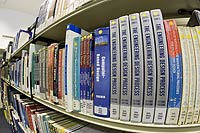Government applauds Kingston research in latest assessment exercise
20/01/09
Government applauds Kingston research in latest assessment exercise
 The 2008 Research Assessment Exercise (RAE) has rated 70 per cent of Kingston University’s research submissions as excellent at international level.
The 2008 Research Assessment Exercise (RAE) has rated 70 per cent of Kingston University’s research submissions as excellent at international level.
Kingston’s Pro Vice-Chancellor for Research and Enterprise, Professor Penny Sparke, said the outcome proved that Kingston was now a significant player in the international arena. “We are very happy with the results,†Professor Sparke said. “Achieving 4* ratings in 12 of the 18 subject areas in which we submitted research shows that there are pockets of research right across the University that are classed as being world-leading.â€
Kingston achieved particularly strong results in nursing, where 15 per cent of the research submitted was judged to have reached 4* level and in business and management studies, where 10 per cent achieved 4* status – making Kingston the highest-rated new university in the field. The honour of being part of the University’s strongest performing subject area went to researchers in the field of history of art, architecture and design with 50 per cent of the research submitted being graded either 3* or 4*. “Our results mean that Kingston is well-placed to attract research grants in its areas of specialist expertise,†Professor Sparke said.
Research advances at Kingston University during the past few years have included:
- A number of high-profile initiatives designed to enhance the capability of CCTV technology, spearheaded by the University’s Digital Imaging Research Centre;
- The development of a Centre for Suburban Studies – the country’s first research centre dedicated to the study of suburban life;
- A number of sustainability projects carried out by engineering experts looking at ways to re-use waste materials, such as glass bottles and tyres, to make building materials, including concrete;
- A major study co-ordinated by staff in the School of Life Sciences which analysed the effects of nutritional supplements taken by athletes in more than 30 different sports;
- Significant new work with healthcare service users, funded by the National Institute of Health Research, exploring how professionals on the ground are experiencing organisational change in primary care environments;
- A series of major research projects from the University’s acclaimed Small Business Research Centre, including a report looking at the importance of entrepreneurs in the corporate workplace and an investigation into the diversity of business suppliers working on projects for the 2012 Olympics;
- The first major retrospective celebrating the life and works of eminent 20th Century sculptor Dora Gordine partly funded through a £46,000 award from the Heritage Lottery Fund.
During the past few years, the University has also supervised many research degree students undertaking projects touching on a myriad of aspects of modern-day life. Their research has covered such areas as; curating contemporary design, international conflict, film and television screen design, e-commerce, Â aerospace engineering and astronautics, legal dispute resolution, innovation and entrepreneurship, forensic analysis, creative industries and the creative economy, hazards and disaster management, rehabilitation, leadership and management in health, cancer biology, sports coaching, criminology, human rights and genocide – to name but a few.
Following the 2008 Research Assessment Exercise the Higher Education funding body for England (HEFCE) will distribute public research funds on the basis of quality, with institutions conducting the best research receiving the largest proportion of the available allocation.
The scoring system for the 2008 RAE:
 The rating system for the 2008 RAE is new, with the quality standard scale now grading research from unclassified to 4* on the basis of a profile, rather than a single grade.
The rating system for the 2008 RAE is new, with the quality standard scale now grading research from unclassified to 4* on the basis of a profile, rather than a single grade.
4* Quality that is world-leading in terms of originality, significance and rigour;
3* Quality that is internationally excellent in terms of originality, significance and rigour but which nonetheless falls short of the highest standards of excellence;
2* Quality that is recognised internationally in terms of originality, significance and rigour;
1* Quality that is recognised nationally in terms of originality, significance and rigour;
u/c Quality that falls below the standard of nationally recognised work.
Summary of Kingston University Research Assessment Exercise 2008 results
- Kingston University achieved a grade point average of 2.04;
- 12 of the 18 units achieved between 5–15 per cent at 4*, denoting world-leading research;
- 30 per cent of activity is now rated 4* and 3*;
- 10 units achieved a grade point average of 2* and above;
- All 18 units achieved a minimum of 10 per cent of 3* research.
The Research Fortnight's Power Table, which incorporates staff numbers, places Kingston University 74th out of 158 institutions, up eight places from 82nd in 2001.